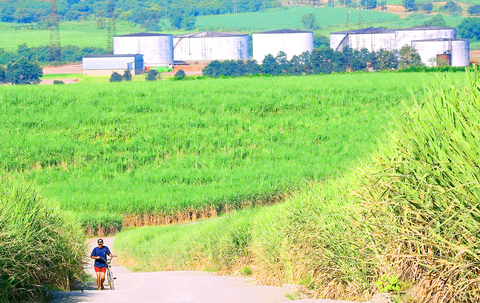Just an hour's drive outside this traffic-choked metropolis where US President George W. Bush will kick off a Latin American tour on Thursday, sugarcane fields stretch for hundreds of kilometers, providing the ethanol that fuels eight out of every 10 new Brazilian cars.
In only a few years, Brazil has turned itself into the planet's undisputed renewable energy leader and the highlight of Bush's visit is expected to be a new ethanol "alliance" he will forge with Brazilian President Luiz Inacio Lula da Silva.
The deal is still being negotiated, but the two leaders are expected to sign an accord on Friday to develop standards to help turn ethanol into an internationally traded commodity, and to promote sugar cane-based ethanol production in Central America and the Caribbean to meet rising international demand.

PHOTO: AP
Across Latin America's largest country, Brazilian media were billing the Bush-Silva meeting as a bid to create a new two-state"OPEC of ethanol," despite efforts by Brazilian and US officials to downplay the label amid concerns that whatever emerges would be viewed as a price-fixing cartel.
Meanwhile, political and energy analysts warned that any agreements reached between Brazil and the US were unlikely to have short-term effects.
And the deal itself could end up largely symbolic because of reluctance by Washington to address a key point of friction: a US$0.14 per-liter US tariff on Brazilian ethanol imports.
"For the Brazilians, the tariff has utmost priority," said Cristoph Berg, an ethanol analyst with German commodities research firm F.O. Licht.
"They will agree with developing biofuel economies around the world, but the first thing they will say is `We want to do away with that tariff," he said.
But no one is expecting Bush to give ground on the tariff.
The politically sensitive issue essentially subsidizes US corn growers who are rapidly ramping up ethanol production amid Washington's encouragement of renewable biofuels to ease US dependence on imported petroleum.
But the visit will help Bush and Lula join forces to promote the politically popular issue of renewable energy simply by gathering in a place where ethanol is king.
At every gas station in the city of 18 million, drivers can fill up with gasoline or ethanol. Ethanol came courtesy of a 1970s decision by former military dictators to subsidize production and require distribution at the pumps.
A 1980s Brazilian fad with cars that ran only on ethanol petered out when oil prices fell in the early 1990s.
But the fuel came back into vogue in 2003 when automakers started rolling out "flex-fuel" cars that run on gasoline, ethanol or any combination of the two.
With international oil prices reaching record highs, Brazilian drivers turned to the cars; most choose ethanol, because it costs about half as much as gas.
The ethanol industry is now making profits like never before amid heavy foreign investment.
Brazil is the world's top exporter, though US ethanol production still surpasses Brazil. Brazil, however, produces it more cheaply.

INVESTIGATION: The case is the latest instance of a DPP figure being implicated in an espionage network accused of allegedly leaking information to Chinese intelligence Democratic Progressive Party (DPP) member Ho Jen-chieh (何仁傑) was detained and held incommunicado yesterday on suspicion of spying for China during his tenure as assistant to then-minister of foreign affairs Joseph Wu (吳釗燮). The Taipei District Prosecutors’ Office said Ho was implicated during its investigation into alleged spying activities by former Presidential Office consultant Wu Shang-yu (吳尚雨). Prosecutors said there is reason to believe Ho breached the National Security Act (國家安全法) by leaking classified Ministry of Foreign Affairs information to Chinese intelligence. Following interrogation, prosecutors petitioned the Taipei District Court to detain Ho, citing concerns over potential collusion or tampering of evidence. The

‘FORM OF PROTEST’: The German Institute Taipei said it was ‘shocked’ to see Nazi symbolism used in connection with political aims as it condemned the incident Sung Chien-liang (宋建樑), who led efforts to recall Democratic Progressive Party (DPP) Legislator Lee Kun-cheng (李坤城), was released on bail of NT$80,000 yesterday amid an outcry over a Nazi armband he wore to questioning the night before. Sung arrived at the New Taipei City District Prosecutors’ Office for questioning in a recall petition forgery case on Tuesday night wearing a red armband bearing a swastika, carrying a copy of Adolf Hitler’s Mein Kampf and giving a Nazi salute. Sung left the building at 1:15am without the armband and apparently covering the book with a coat. This is a serious international scandal and Chinese

Seventy percent of middle and elementary schools now conduct English classes entirely in English, the Ministry of Education said, as it encourages schools nationwide to adopt this practice Minister of Education (MOE) Cheng Ying-yao (鄭英耀) is scheduled to present a report on the government’s bilingual education policy to the Legislative Yuan’s Education and Culture Committee today. The report would outline strategies aimed at expanding access to education, reducing regional disparities and improving talent cultivation. Implementation of bilingual education policies has varied across local governments, occasionally drawing public criticism. For example, some schools have required teachers of non-English subjects to pass English proficiency

TRADE: The premier pledged safeguards on ‘Made in Taiwan’ labeling, anti-dumping measures and stricter export controls to strengthen its position in trade talks Products labeled “made in Taiwan” must be genuinely made in Taiwan, Premier Cho Jung-tai (卓榮泰) said yesterday, vowing to enforce strict safeguards against “origin laundering” and initiate anti-dumping investigations to prevent China dumping its products in Taiwan. Cho made the remarks in a discussion session with representatives from industries in Kaohsiung. In response to the US government’s recent announcement of “reciprocal” tariffs on its trading partners, President William Lai (賴清德) and Cho last week began a series of consultations with industry leaders nationwide to gather feedback and address concerns. Taiwanese and US officials held a videoconference on Friday evening to discuss the